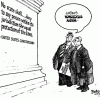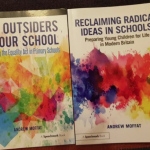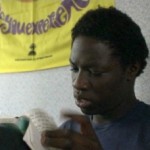This lesson is mostly based on interviews with Geoff Hardy and Tim Lucas, former members of The Gay Teachers Group (forerunner to Schools OUT UK) who describe the momentous events of the 1983 NUT Conference, which was held on Jersey. In the second part of the lesson, Myrtle Finley from the Proud Trust (then LGBT Youth […]

Citizenship: Campaigning and Protest – A British Value?

Exploring different kinds of rights and obligations
Context: Blue Eye / Brown Eye is an experiment first performed in the USA by Jane Elliot in 1968. The experiment was performed by Elliot on the day after Martin Luther King, Jr. was assassinated, to demonstrate what prejudice was to her third grade class. This activity enables pupils to experience, first hand, what prejudice […]

KS5: Citizenship – ‘Perspective on LGB Rights’
Learners will be discussing a range of opinions in relation to homosexuality and the rights of Lesbian, Gay and Bisexual (LGB) people; in particular they will be thinking about homophobic bullying in schools and about ongoing debates concerning same-sex parenting and adoption. They will have previously considered things like the influence of the media on […]

KS4: Citizenship – ‘International Human Rights’
This KS4 Citizenship lesson poses questions to learners after indepth research activities such as: Should our government ‘interfere’ with human rights policy on other countries? Should we enforce basic human rights in other countries? Should other countries be able to decide for themselves how they want their own people to be treated? Is it acceptable […]

KS4: SRE – ‘All Kinds of People, All Kinds of Sex’
We know from working with schools that many teachers find the idea of an SRE lesson that discusses LGBT sex to be very intimidating. Teachers are worried about getting it wrong or making assumptions that such a session is needed. This lesson is designed to be very simple to deliver, and to require very minimal […]
Recent Videos
Recent Posts
- KS4 English – Shakespeare, Sonnets and Sexuality
 NO OUTSIDERS IN OUR SCHOOLS Teaching the Equality Act in Primary Schools & RECLAIMING RADICAL IDEAS IN SCHOOLS Preparing Young Children for Life in Modern Britain By Andrew Moffat
NO OUTSIDERS IN OUR SCHOOLS Teaching the Equality Act in Primary Schools & RECLAIMING RADICAL IDEAS IN SCHOOLS Preparing Young Children for Life in Modern Britain By Andrew Moffat PSHE – Alphabet Soup
PSHE – Alphabet Soup KS3 – PSHE – Shark Bait
KS3 – PSHE – Shark Bait KS4 – PSHE Omar: Young, Gifted and Gay 2 Part 1
KS4 – PSHE Omar: Young, Gifted and Gay 2 Part 1
Tags
SUBMIT YOUR OWN
COPYRIGHT STATEMENT
If copyright is claimed in any photograph which appears on this website, please contact us and we will happily remove it.
Subscribe / Connect
Subscribe to our e-mail newsletter to receive updates.


